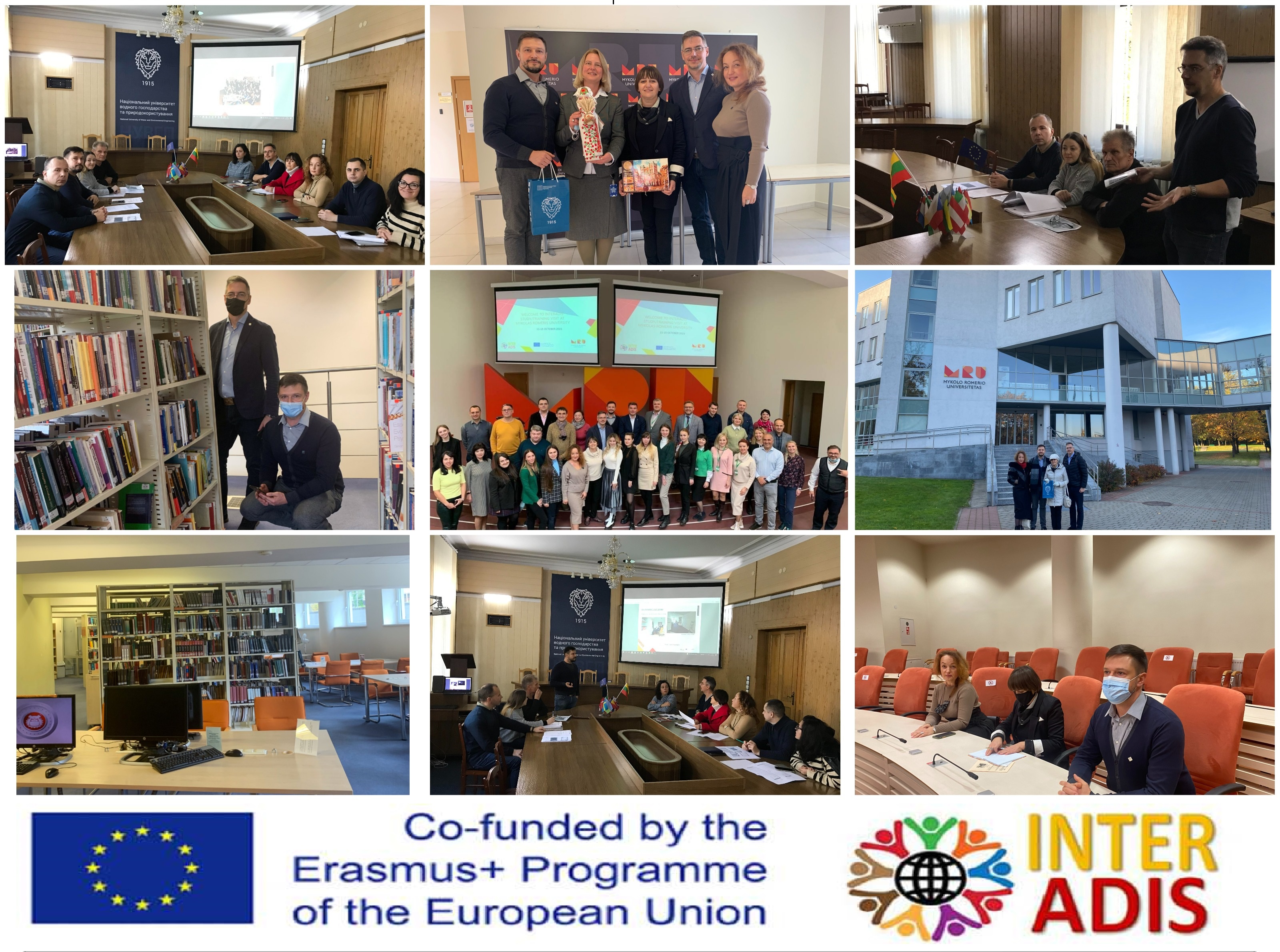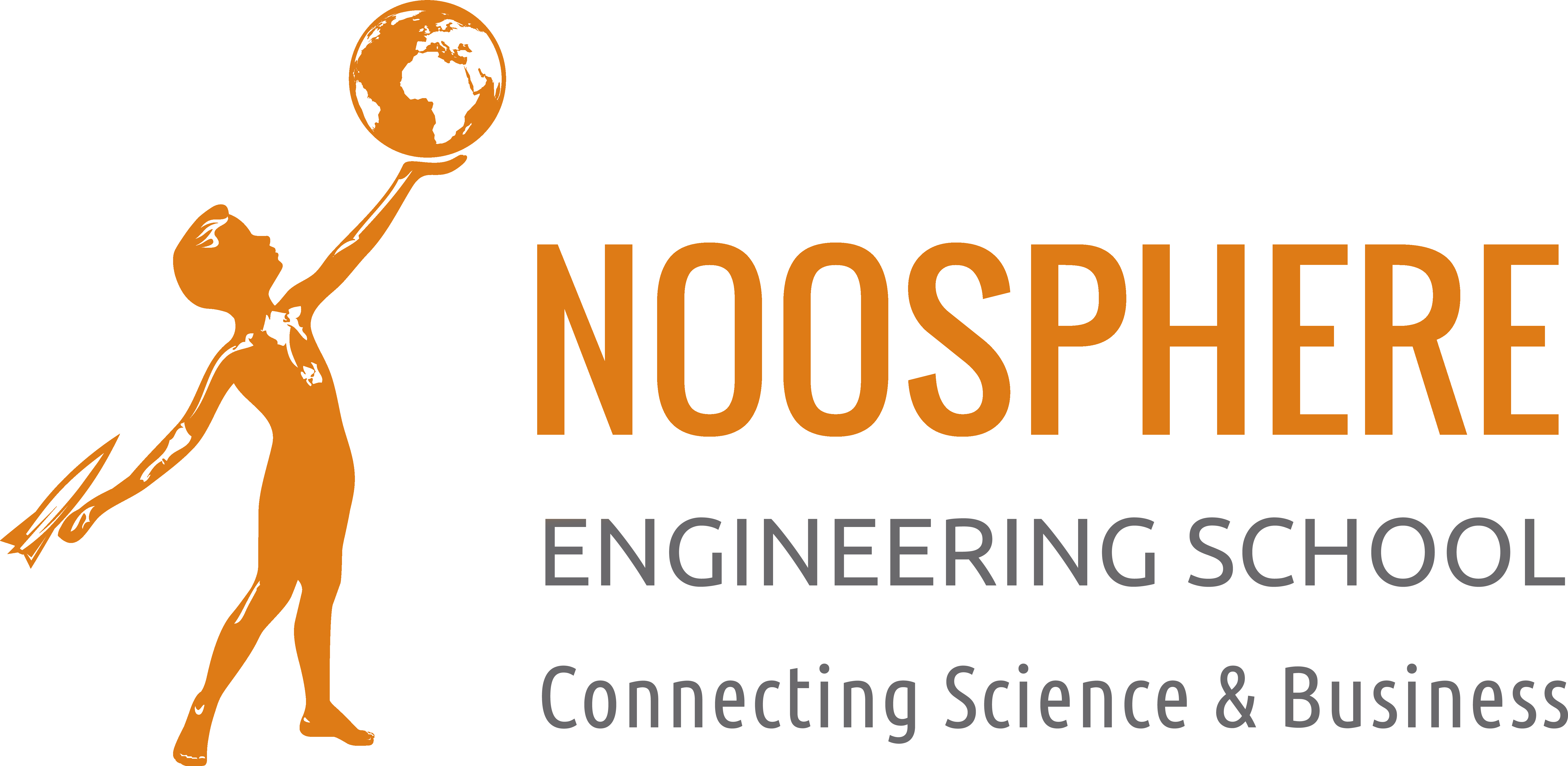On October 22, 2021 there was in-depth discussion on the results of workshops in Yuriy Fedkovych Chernivtsi National University held on October 4-5, 2021 and study visit to Mykola Romeris University (Vilnius, Republic of Lithuania), which took place within the INTERADIS grant project "Integration and adaptation of foreign students" (619451-ERR-1-2020-1-NL-EPPKA2-CBHE-JP) during the period from October 10 to 16, 2021
Five representatives of the National University of Water and Environmental Engineering, namely: Vladyslav Solodkyi, Dmytro Nikytenko, Andrii Podlevskyi, Yuliana Krasovska and Oksana Podlevska, participated in the workshop in Chervtsi and study and training visit to Lithuania.
The main project goal is to expand and improve the capacity of higher education institutions of Ukraine in the field of international students’ integration and adaptation. The Project is co-funded by the Erasmus+ Program of the European Union with the support of the National Erasmus + Office in Ukraine.
The first day of the study visit covered speeches of representatives of Lithuanian Erasmus + National Agency Vitalijus Zencenko and Greta Kiskiene, Head of the International Office of Mykolas Romeris University (MRU) Audra Dargyte Burokiene, Head of Head of Academic Affairs Centre Inga Dauksiene and Chief Manager for Incoming Students of the International Office Inesa Cvetkova.
Representatives of the Lithuanian Erasmus+ National Agency presented information on Ukraine's place in mobility programs in 2015-2020 and prospects for credit mobility in 2021-2027. Thus, in particular, the new stage envisages the introduction of such types of mobility as short-term, mixed and intensive mixed programs.
Audra Dargyte Burokiene, Head of the International Office of Mykolas Romeris University (MRU), presented information on changes in the organizational structure and staff functions of the International Office, who are involved in the process of internationalization of the University since 2016. The structure of the International office of the MRU is similar to our Center for International Cooperation and Education, which also includes departments dealing with credit mobility of domestic students, mobility of teachers, promotion and admission of international students and their support, reception of foreign delegations.
The main goals of the International Office of the MRU and the NUWEE Center for International Cooperation and Education are quite similar: to increase the number of international students (up to 10% of the total number of students), to improve the quality of students, to expand the geography of entrants; to increase the number of students on credit mobility.
Head of Academic Affairs Centre Inga Dauksiene presented its structure and main areas of work. Thus, unlike our Center and due to the peculiarities of migration legislation, the MRU has a Career center, which provides information to international students about possible jobs and available vacancies in the labor market. The instruments of international students’ integration into the university environment are interesting. Introductory "0" week, meeting with graduates, supervision, mentoring, student government and the availability of a student guide contribute to smoother integration of international students.
During the introductory "0" week, international students in a clear and simple way integrate into the educational environment, get acquainted with the university infrastructure and values of the university, master the basic academic rules and living conditions, assessment of learning outcomes, curriculum features, etc.
Inesa Cvetkova, Chief Manager for Incoming Students of the International Office, presented detailed algorithm of the process for engaging international students, that is divided it into 2 stages: before arrival and after arrival at the university. What impressed our group the most was the availability of software that helps to digitalize the communication processes between the university and the applicant, starting with the application and ending with the settlement at the university.
The integration of international students upon arrival involves providing to the student a complete package of information on academic information (study schedule, call schedule), campus location, contact details and consultation times, emergency phone numbers, information on preventing the spread of coronavirus infection COVID-19, list possible socio-cultural events.
The work of staff with international students has its own peculiarities, and therefore in the MRU they follow this rule: "Think in two languages!"
Laura Stefanovych, President of the MRU Erasmus Student Network, described how senior students help fresh students with both adaptation and integration.
The project participants also got acquainted with the work of the King Sejong Institute, which is strongly represented in the MRU.
The second day of the visit started with the results of the survey of project participants, which took place on the first day of the visit. According to the survey, all universities have a structural unit that is responsible for promotion, teaching-studying process, international students adaptation. There was also a brainstorming on the experience of interaction and adaptation of international students into a new environment for them.
The presentations prepared by representative of the Marketing Department proved that the problem of using adequate SMM tools in promoting the university and attracting potential students abroad is relevant and very important.
During the question-and-answer session, Dmytro Nikytenko asked Audra Dargyte Burokiene, how the MRU addresses the issue of determining the minimum sufficient number of students in groups and what the MRU does if this minimum number is not achieved.
Also on this day there was a meeting of project participants with the Ambassador of Ukraine to the Republic of Lithuania Volodymyr Yatsenkivskyi. Possible steps of cooperation between educational institutions of Ukraine, the Embassy of Ukraine in the Republic of Lithuania and Lithuanian educational institutions were discussed at the meeting.
The session with the Head of the PhD and Doctoral programs Department, who shared the experience about the peculiarities of their preparation, requirements to the scientific work and opportunities for students to participate in research projects in which MRU is a participant, in particular in the context of sustainable development, was very useful.
The third day of the study visit was also dedicated to the mechanism of advertising of potential international applicants in Lithuania and Vilnius in particular. Thanks to the program “Go Vilnius”, international students can learn essential information about Lithuania in an easy and accessible form.
Students from Turkey Hatice Dindar, Emine Ozmen and from Austria Christian Helzlwimmer, who came MRU within the credit mobility program, shared their experiences of adapting and integrating into the university environment, as well as what they do now as mentors to adapt new university students.
The next event was at the Center for Civic Education, which is located on the territory of the Presidential Palace. This is a real modern digital center that educates a citizen of his country, who has knowledge about the history and modernity of his/her country. The exhibit-model was the distribution of state budget expenditures and the possibility of adjusting the share of certain components.
The fourth day of the visit began in an unusual format. The student mentors, who we met on the third day, showed in practice how they conduct a tour in Vilnius. We saw the Cathedral of St. Anna, climbed the Gediminas Tower, took a walk in the Benedictine Gardens, experienced the authenticity of contemporary art in the cultural quarter of the Republic of Užupis and completed the tour in the Town Hall Square.
In general, the following conclusions can be drawn about the study visit to the Mykolas Romeris University:
- It is essential to use of information technologies at the stage of application and registration of international entrants.
- All the participants learned how to optimize and structure administrative procedures that will improve the integration of international students into the new environment.
- Best practices of a roadmap for the adaptation of international students creation were analyzed with the aim to implement at the home university.
- Conducting an adaptation course for the enrolled international students is of the need.
- Actively use of modern SMM instruments and relevant social networks to promote the university abroad will make your university effectively visible.
- A set of organizational measures for smooth integration and adaptation of international students is important.
- Involvement of state institutions in the process of adaptation and support of university initiatives aimed at attracting international students will help to increase the number of international students at the university.
We would like to extend our sincere gratitude to the MRU staff who prepared such an informative visit and shared their experience in the adaptation and integration of international students.
Читайте нас також:















